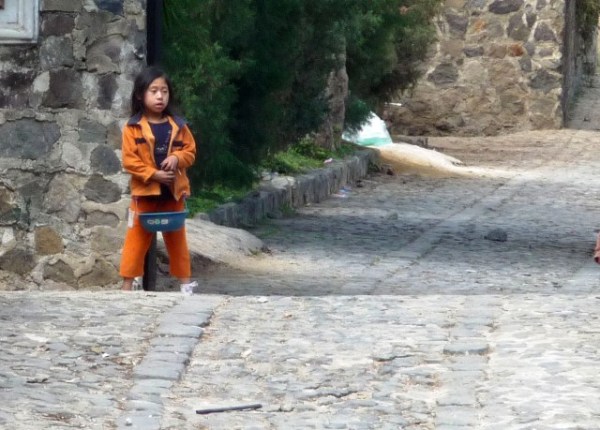The girl with sad brown eyes and dirt streaked cheeks prominently displayed the infant in her arms as she followed close behind our group. We recognized her for what she likely was, a scam; pressed into service by some unscrupulous adult to prey on the guilt of well-to-do tourists.
We came mostly prepared to emotionally handle children beggars, to the extent you can ever really prepare yourself for such things. We understand that giving them money directly only encourages more adults to abuse children in this way. The dollars they receive from well-meaning tourists often binds them, and future generations, to a world of servitude. Better, in our view, to give those dollars to reputable charities in the countries we visit that work to break that vicious cycle (please go to the botom of the post for more).
The children we saw carrying baskets and picking coffee beans at the Finca Filadelphia plantation were similar in many ways but more affecting in one; our complicity. While we refuse to support the industry that recruits sad-eyed children with outstretched palms, we do enjoy our morning cup of Joe.
Our guide put the best possible spin on everything we saw, saying that schools were closed during harvest time and that the children carrying baskets were merely playing. That doesn’t exactly square with the other children we saw a short drive away wearing school uniforms.
Later we learned that sending kids to school in Guatemala is expensive. Parents are expected to provide all school supplies which, for subsistence farmers with several children, can run considerably more than a month’s income. Add the lost potential wages from child labor, and it is easy to see the economic incentives that keep children in the field and out of the classroom.
In the back of our minds we know the coffee we drink is often harvested for pennies on the pound by poor families and their children. Just as we know the electronics we use and the clothes we wear are sometimes assembled in sweat shops. We know these things but they often exist for us in some kind of alternate universe, completely outside our own experience. They’re so foreign to our day-to-day lives that it is easy to pretend they don’t really happen. Seeing it for yourself shatters the illusion.
We’re not so naïve to believe there are easy answers. Children and adults work in horrid conditions because the alternatives are worse. Shutting down sweatshops or boycotting products doesn’t help the people who rely on the meager wages they provide.
Fortunately, aid organizations like Heifer International have found a better way.
Instead of giving one-time handouts to needy families, Heifer works to create sustainable, and virally infectious, community improvement. The heart of their mission is to teach people to help themselves, give them the means to do it, monitor their progress, and then require them to give back to other needy families in the Heifer program.
The breadth and complexity of Heifer’s approach is of the kind and quality needed to meet the complexity of the problems they’re tackling. I encourage our readers to visit their site as well as Betty Londergan’s (a fellow blogger working for Heifer whom we had the good fortune to meet in Guatemala) to see for themselves. More than that, we encourage our readers to give.
Toward that end we’re offering to match the first $1,000 in donations to Heifer by our readers (donate here). Simply send us an e-mail to tell us how much you donated and we’ll make a matching contribution of our own.
Please forward this post to everyone you can think of (use the little buttons at the bottom if you’d like). The offer to match donations is open to all comers!






















Heifer International is indeed universally respected for its effectiveness and integrity and is one that my denomination (United Methodist) endorses and works with a lot in global mission and outreach. Good posting with great advice.
LikeLike
Closer to home, we stopped to see a crab cannery on the Eastern Shore of Maryland a couple of years ago. Having gone to a “whack a crab” restaurant the night before I was interested to see how it was done on a large scale, fully respecting the tedium and difficulty it involved. The cannery owner receives permission to bring in 90 foreign workers, most form Latin America. Very few locals want to do this work. He needs about 150 workers so much of the crab ends up going bad, no matter how they work, they can’t work fast enough to get the meat out before it is considered too old to pack. They are paid so much per pound, working as fast as possible. Gone from their families for 6 months of the year, they return year after year because this is GOOD money at home. What a life. We are so complacent with our own situations.
LikeLike
Glad to read of your endorsement of Heifer Inc. Our family donated to them at Christmas. We also buy “Fair Trade” coffee from our church which helps coffee growers in other countries create a sustainable life.
LikeLike